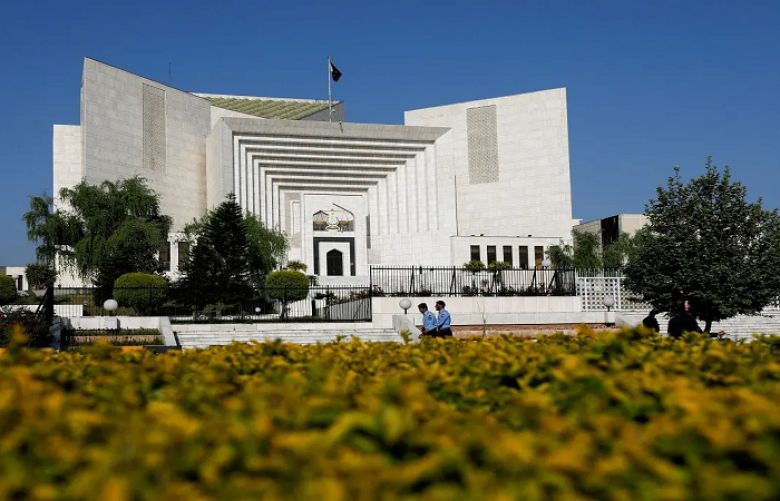The Supreme Court of Pakistan on Monday reserved the verdict on petitions challenging the Supreme Court (Review of Judgments and Orders) Act 2023 after arguments were completed from both sides.
A three-member bench of the apex court headed by Chief Justice Bandial and comprising Justice Ijazul Ahsan and Justice Munib Akhtar heard the petitions challenging the vires of the Supreme Court (Review of Judgments and Orders) Act 2023.
Ghulam Mohiuddin, Zaman Khan Vardak and the Jurists Foundation, through its CEO Riaz Hanif Rahi, had challenged the vires of the Act.
During today’s hearing, AGP Mansoor Usman Awan and PTI lawyer Ali Zafar concluded their arguments in the case after which the apex court reserved its verdict.
“We will announce the verdict after discussing it among ourselves,” Justice Bandial said. “Let’s see what happens.”
At the outset of the hearing today, the attorney general resumed his arguments and contended that Article 188 of the Constitution — which states that the SC has the power to review any judgment pronounced or any order made by it — did not limit the scope of a review.
“Extending the scope of review in cases pertaining to Article 184(3) is not discriminatory,” he stated, highlighting that appeals were filed in the SC against decisions taken by high courts or tribunals.
“But a case linked to Article 184(3) comes directly to the apex court,” Awan said.
Article 184(3) of the Constitution grants the SC powers to issue an order if it considers a question of public importance with reference to the enforcement of fundamental rights involved.
Meanwhile, the CJP clarified that the SC had not opposed extending the scope of the review. “The question is on the manner in which the scope of review was extended,” he said.
Justice Bandial also pointed out that the Indian supreme court did not give the right of appeal in such cases. “We don’t understand the reason for extending the scope of review.”
For his part, the AGP said that the top court had the power of review under Article 188 of the Constitution and there was “no limit” as per the law. “But cases and appeals under Article 184(3) cannot be treated in the same way,” he argued.
At that, the top judge remarked that lawmakers had the power to legislate but at the same time asked how review and appeal can be viewed as the same.
“The court has to keep facts in consideration,” Justice Bandial said. “If the power of review is extended, will it not be discriminatory?”
The AGP replied that there were several decisions of the Supreme Court regarding the legislative power of the Parliament. “A separate jurisdiction has been kept for review in cases pertaining to Article 184(3).”
Awan further stated that the impression that some people were being exploited by the right of review was incorrect. He also said that the facts of the case would not be altered by extending the scope of review.
“In review [cases], the aggrieved party must be allowed to raise every legal point. Even those legal points that were not raised earlier can’t change the facts of a case,” the AGP stated, adding that even the Indian SC had accepted raising new points in the review.
At one point during the hearing, Justice Akhtar asked if the AGP wanted the court to omit the word ‘appeal’ from the law.
“I have not reached to that point yet,” the attorney general replied, admitting that the wording of the review judgments law was not the best and there were some “issues” with its language.
At the previous hearing, the CJP had observed that laws like the Supreme Court (Review of Judgements and Orders) Act, 2023 should have been enacted after taking advice from people like the attorney general for Pakistan (AGP), who have experience with litigation.
He had said the apex court would welcome any remedy provided in respect of its orders or judgements given under Article 184(3), which allows the Supreme Court to assume jurisdiction in matters of public importance, but added that “we expect that such laws should be formulated carefully”.







